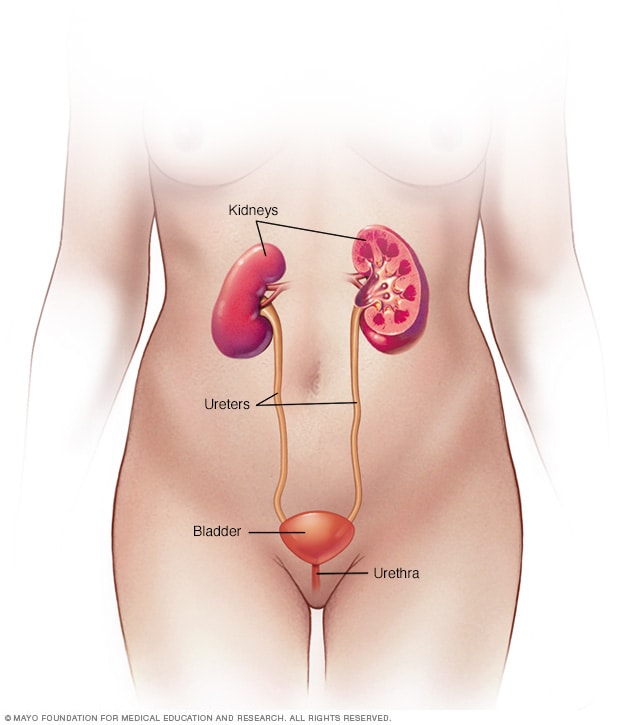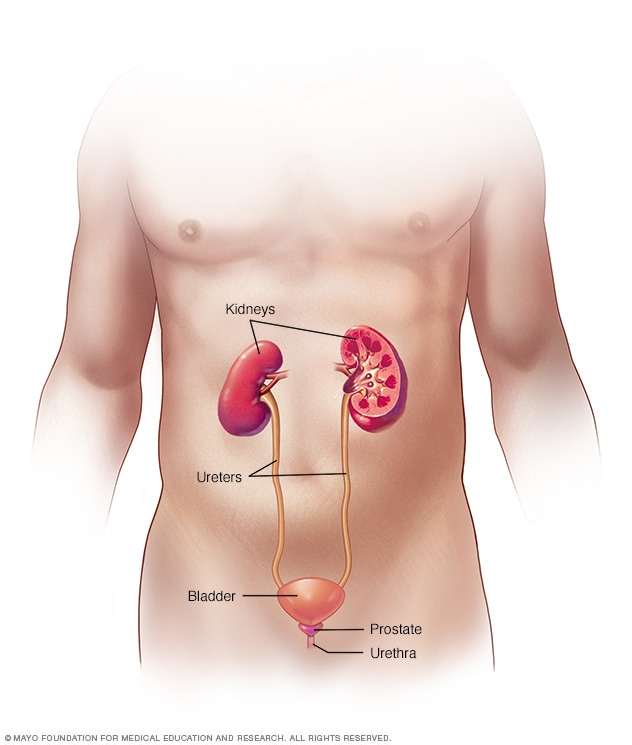NATURAL REMEDY FOR KIDNEY INFECTIONS
- Get link
- X
- Other Apps
NATURAL REMEDIES FOR KIDNEY INFECTION

Overview
Kidney infection (pyelonephritis) is a type of urinary tract infection (UTI) that generally begins in your urethra or bladder and travels to one or both of your kidneys.
A kidney infection requires prompt medical attention. If not treated properly, a kidney infection can permanently damage your kidneys or the bacteria can spread to your bloodstream and cause a life-threatening infection.
Kidney infection treatment, which usually includes antibiotics, might require hospitalization.
Symptoms
Signs and symptoms of a kidney infection might include:
- Fever
- Chills
- Back, side (flank) or groin pain
- Abdominal pain
- Frequent urination
- Strong, persistent urge to urinate
- Burning sensation or pain when urinating
- Nausea and vomiting
- Pus or blood in your urine (hematuria)
- Urine that smells bad or is cloudy.
Causes
Bacteria that enter your urinary tract through the tube that carries urine from your body (urethra) can multiply and travel to your kidneys. This is the most common cause of kidney infections.
Bacteria from an infection elsewhere in your body also can spread through your bloodstream to your kidneys. Although it's unusual to develop a kidney infection, it can happen — for instance, if you have an artificial joint or heart valve that becomes infected.
Rarely, kidney infection results after kidney surgery.
Risk factors
Factors that increase your risk of a kidney infection include:
- Being female. The urethra is shorter in women than it is in men, which makes it easier for bacteria to travel from outside the body to the bladder. The nearness of the urethra to the vagina and anus also creates more opportunities for bacteria to enter the bladder.Once in the bladder, an infection can spread to the kidneys. Pregnant women are at even higher risk of a kidney infection.
- Having a urinary tract blockage. This includes anything that slows the flow of urine or reduces your ability to empty your bladder when urinating — including a kidney stone, something abnormal in your urinary tract's structure or, in men, an enlarged prostate gland.
- Having a weakened immune system. This includes medical conditions that impair your immune system, such as diabetes and HIV. Certain medications, such as drugs taken to prevent rejection of transplanted organs, have a similar effect.
- Having damage to nerves around the bladder. Nerve or spinal cord damage can block the sensations of a bladder infection so that you're unaware when it's advancing to a kidney infection.
- Using a urinary catheter for a time. Urinary catheters are tubes used to drain urine from the bladder. You might have a catheter placed during and after some surgical procedures and diagnostic tests. You might use one continuously if you're confined to a bed.
- Having a condition that causes urine to flow the wrong way. In vesicoureteral reflux, small amounts of urine flow from your bladder back up into your ureters and kidneys. People with this condition are at higher risk of kidney infection during childhood and adulthood.
Complications
If left untreated, a kidney infection can lead to potentially serious complications, such as:
- Kidney scarring. This can lead to chronic kidney disease, high blood pressure and kidney failure.
- Blood poisoning (septicemia). Your kidneys filter waste from your blood and return your filtered blood to the rest of your body. Having a kidney infection can cause the bacteria to spread through your bloodstream.
- Pregnancy complications. Women who develop a kidney infection during pregnancy may have an increased risk of delivering low birth weight babies.
Know Your Kidney Numbers: Two Simple TestsDid you know one in three American adults is at risk for kidney disease? Anyone can get kidney disease at any time. If kidney disease is found and treated early, you can help slow or even stop it from getting worse. Most people with early kidney disease do not have symptoms. That is why it is important to be tested. Know your kidney numbers!
Your kidney numbers include 2 tests: ACR (Albumin to Creatinine Ratio) and GFR (glomerular filtration rate). GFR is a measure of kidney function and is performed through a blood test. Your GFR will determine what stage of kidney disease you have – there are 5 stages. Know your stage.ACR is a urine test to see how much albumin (a type of protein) is in your urine. Too much albumin in your urine is an early sign of kidney damage.
- Urine Test called ACR. ACR stands for “albumin-to-creatinine ratio.” Your urine will be tested for albumin. Albumin is a type of protein. Your body needs protein. But it should be in the blood, not the urine. Having protein in your urine may mean that your kidneys are not filtering your blood well enough. This can be a sign of early kidney disease. If your urine test comes back “positive” for protein, the test should be repeated to confirm the results. Three positive results over three months or more is a sign of kidney disease.
- Blood Test to estimate your GFR. Your blood will be tested for a waste product called creatinine. Creatinine comes from muscle tissue. When the kidneys are damaged, they have trouble removing creatinine from your blood. Testing for creatinine is only the first step. Next, your creatinine result is used in a math formula with your age, race, and sex to find out your glomerular filtration rate (GFR). Your GFR number tells your healthcare provider how well your kidneys are working. Check with your doctor about having a GFR test.
A normal amount of albumin in your urine is less that 20 mg a day. A normal total protein amount in your urine is less that 150 mg a day. If your test shows high levels of urine albumin, or a rise in urine albumin, it could mean you have kidney damage or disease.According to the National Kidney Foundation, normal results range from 90 to 120 mL/min/1.73 m2. Older people will have lower than normal GFR levels, because GFR decreases with age. Normal value ranges may vary slightly among different laboratories. Some labs use different measurements or test different samples.
Your kidney numbers include 2 tests: ACR (Albumin to Creatinine Ratio) and GFR (glomerular filtration rate). GFR is a measure of kidney function and is performed through a blood test. Your GFR will determine what stage of kidney disease you have – there are 5 stages. Know your stage.ACR is a urine test to see how much albumin (a type of protein) is in your urine. Too much albumin in your urine is an early sign of kidney damage.
- Urine Test called ACR. ACR stands for “albumin-to-creatinine ratio.” Your urine will be tested for albumin. Albumin is a type of protein. Your body needs protein. But it should be in the blood, not the urine. Having protein in your urine may mean that your kidneys are not filtering your blood well enough. This can be a sign of early kidney disease. If your urine test comes back “positive” for protein, the test should be repeated to confirm the results. Three positive results over three months or more is a sign of kidney disease.
- Blood Test to estimate your GFR. Your blood will be tested for a waste product called creatinine. Creatinine comes from muscle tissue. When the kidneys are damaged, they have trouble removing creatinine from your blood. Testing for creatinine is only the first step. Next, your creatinine result is used in a math formula with your age, race, and sex to find out your glomerular filtration rate (GFR). Your GFR number tells your healthcare provider how well your kidneys are working. Check with your doctor about having a GFR test.
A normal amount of albumin in your urine is less that 20 mg a day. A normal total protein amount in your urine is less that 150 mg a day. If your test shows high levels of urine albumin, or a rise in urine albumin, it could mean you have kidney damage or disease.
According to the National Kidney Foundation, normal results range from 90 to 120 mL/min/1.73 m2. Older people will have lower than normal GFR levels, because GFR decreases with age. Normal value ranges may vary slightly among different laboratories. Some labs use different measurements or test different samples.
Prevention
Reduce your risk of kidney infection by taking steps to prevent urinary tract infections. Women, in particular, may reduce their risk of urinary tract infections if they:
- Drink fluids, especially water. Fluids can help remove bacteria from your body when you urinate.
- Urinate as soon as you need to. Avoid delaying urination when you feel the urge to urinate.
- Empty the bladder after intercourse. Urinating as soon as possible after intercourse helps clear bacteria from the urethra, reducing your risk of infection.
- Wipe carefully. Wiping from front to back after urinating and after a bowel movement helps prevent bacteria from spreading to the urethra.
- Avoid using feminine products in the genital area. Using products such as deodorant sprays in your genital area or douches can be irritating.

Below is your Solution
The KIDNEY DETOX KIT is specially designed to detoxify, flush and purge the kidney of its build up of Toxins. Toxins accumulate and stones form when the kidneys are not functioning at its normal efficiency.
A Kidney Detox involves eating a healthy organic diet and drinking an organic, herbal kidney cleanse supplements for 2 to 3 to stimulate the kidney and soften any deposits.
The Kidney Detox Kit also includes an intestinal cleanse with probiotic supplements which encourage internal environment to enable proper nutrients absorption in the body.
This is the fresh, effective and the best approach we offer in resolving any kidney disorder At All. Get your package today and be free from kidney failure, kidney stones ETC.
GET YOUR FULL KIDNEY DETOX KIT AT
GHC1600.00
MEDIUM PACK GHC 900.00
MINI PACK GHC480.00
TO PLACE YOUR ORDER, KINDLY
Just Send the Following Information:
1. Your Full Name
2. Your Full House or Office Address
3. The Name Of The Pack You Want
4. Your Choice Date Of Delivery
5. Your Best Phone Numbers
6. Your email address (if Available)
- Get link
- X
- Other Apps



Comments
Post a Comment